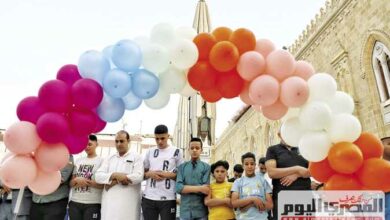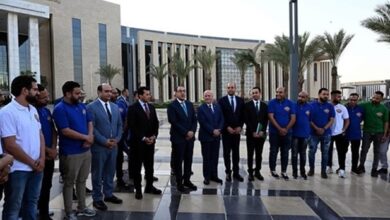As families gather around the table to break fast during the holy month of Ramadan, a seemingly endless list of drama series fiercely vie for viewers' attention around their television sets all month round.
Egypt’s political and economic turmoil has clearly taken its toll on the series' production costs as well as the themes they tackle this year.
Around 55 new series are being broadcast on Egyptian and Arab satellite channels this Ramadan, including seven that had already been produced in 2012, but postponed until now.
The number of drama shows screened on the small screen this Ramadan has not suffered a sharp decline in comparison to last year’s production, which saw 60 dramas aired.
The total cost of production, however, has fallen from LE1.5 billion (US$213 million) last year to LE900 million ($128 million) this year.
Deep-running political rifts dominate TV series this year more than ever. There's no escape from the seemingly all-consuming tensions of everyday life in Egypt.
Al-Daiea (The Preacher), one of the most talked about TV series this Ramadan, tackles the controversial issue of whether art is religiously proscribed or not. It's an issue that has been frequently debated in Islamic societies, but strongly stirred over the past couple of years in Egypt after Islamists ascended to power.
Nader Aldy, critic, described the series as a “challenge” to the conservative ideologies extolled by some preachers and so-called religious scholars during the one-year rule of the Muslim Brotherhood.
The story, which was written by Medhat al-Adl before the downfall of Islamist President Mohamed Morsy, focuses on the clash between art and extremism and how Islamists use religion as a tool to brainwash people to fulfil their own political ends.
This clash is presented between ultra-conservative preacher Youssef (Hani Salama) and an activist and violinist Nesma (Basma). The preacher gradually changes his perspective on music.
“The idea the series is based on is not new, but it has been cleverly implemented in a way that goes along with today’s socio-political rifts,” Adly said.
“Featuring a love story in which each side embodies a complete different political trend and linking it to the current incidents taking place in Egyptian society is what really arouses viewers' excitement to see what happens next…despite the slow rhythm of events.”
Another critically acclaimed Ramadan series is Ism Moaqat (Temporary Name) starring Youssef al-Sherif, who has been known for his action roles in the past couple of years in Ramadan series like Taraf Talet (A Third Party) and Rakam Maghool (Anonymous Number).
Adly believes that Ism Moaqat, directed by Ahmed Galal, is a slick production in its direction, script and pace.
“The director has given a lot of attention to minor details,” critic Adly said. “This makes every piece in the puzzle perfectly fit together.”
The series puts one eye on nifty action sequences between the hero and his enemies, and another eye on the 2012 presidential race and the issues surrounding it, including the dual nationality of prominent and controversial Salafi preacher and presidential candidate, Hazem Salah Abu Ismail.
Hanaa Naguib, another critic, echoed the sentiment saying that the series has a cohesive vision along with a defined dramatic structure that arouses viewers’ interest and gives credibility to events.
Zat (Self), based on a novel of the same name by renowned novelist and short story writer Sonallah Ibrahim, has meanwhile been a little overlooked.
The series, directed by Kamla Abu Zakry and written by Mariam Naoum, displays the history of modern Egypt since the 1952 coup until modern times through the heroine’s life – Zat, played by actress Nelly Karim.
This kind of historical drama, Adly believes, is worth watching because it presents a historical panorama of the most important events in Egyptian history, as well as their influence on an individual.
“The series could fall under the documentary-style genre because it shows historic speeches from the late presidents of Egypt, including Gamal Abdel Nasser’s resignation after the 1967 defeat and Anwar al-Sadat’s speech in Jerusalem.”
Despite a less accomplished dramatic structure, several lighter and more humorous series have managed to bring in large audiences despite this Ramadan's bumper TV schedule.
Al-Araf (The Fortuneteller) is the biggest production this season, reaching LE50 million ($7.1 million).
Nevertheless, Naguib believes that the comedian superstar Adel Iman’s immense popularity is the main draw accounting for the series' success.
“Adel Imam’s undeniable sense of humor and spontaneity are always the magnet for his huge fan base. However, the storyline is incapable of competing with other series screened this Ramadan," Naguib explained.
The series tells the story of a professional crook that impersonates different characters to get out of dilemmas in a witty manner. Eventually he begins to gain ground in Egyptian politics. The comic series’ theme is mingled with social issues and a touch of political comment.
Al-Araf is written by Youseef Maati, produced by Tamer Morsy and directed by Adel’s son, Rami Imam.
Meanwhile, the third installment of Al-Kabeer (The Big Man) starring the comic star Ahmed Mekki and famous actress Donia Samir Ghanim, has been met with disappointment.
“Obviously, Mekki has been trying to build on the success of the first two installments of the series, but the plot and the style have not come with anything new this season,” Naguib said.
“The reappearance of Hazaloum character, which enjoyed a huge success in La Tarago Wala Istislam (Neither Regression Nor Surrender), failed to add a fresh, comic flavor to the series as a consequence of his lacklustre performance.”
Over the past few years, there had been a tendency to reproduce ideas from past popular films, among them Al-Aar (The Disgrace), Al-Batnia, and Samara.
Al Zawga al-Thaneya (The Second Wife) is " a shock," as Adly puts it. The series adopted the story of a notable film of the same name directed by leading director Salah Abu Seif in 1967.
The film is considered a masterwork in the history of Egyptian cinema, starring a host of superstars Soaad Hosni, Sanaa Gamil, Shoukry Sarhan and Salah Mansour.
Ayten Amer is filling the shoes of Hosni this year, while Ola Ghanem is playing the role of Sanaa Gamil.
“The series is a big flop in every sense of the word. It is a very poor version of the original work of art and no one can even come close to the great performance of the prominent actors casted in the film,” Adly said.
Adly went on to explain that the series lacks credibility. “In the beginning of the film, Abu Seif used the shadow technique to convey to viewers that the story is a work of fiction.”
The storyline of the film comprises some events that stand against Eastern traditions and Islamic teachings; an example of this is forcing a husband to divorce his wife and then another man marries her before three months have passed.
“The series’ director Khairy Beshara tried to create a real world out of the same events by stuffing unpersuasive details in an attempt to get the story closer to reality. Consequently the dramatic structure lacked accuracy,” Adly said.




